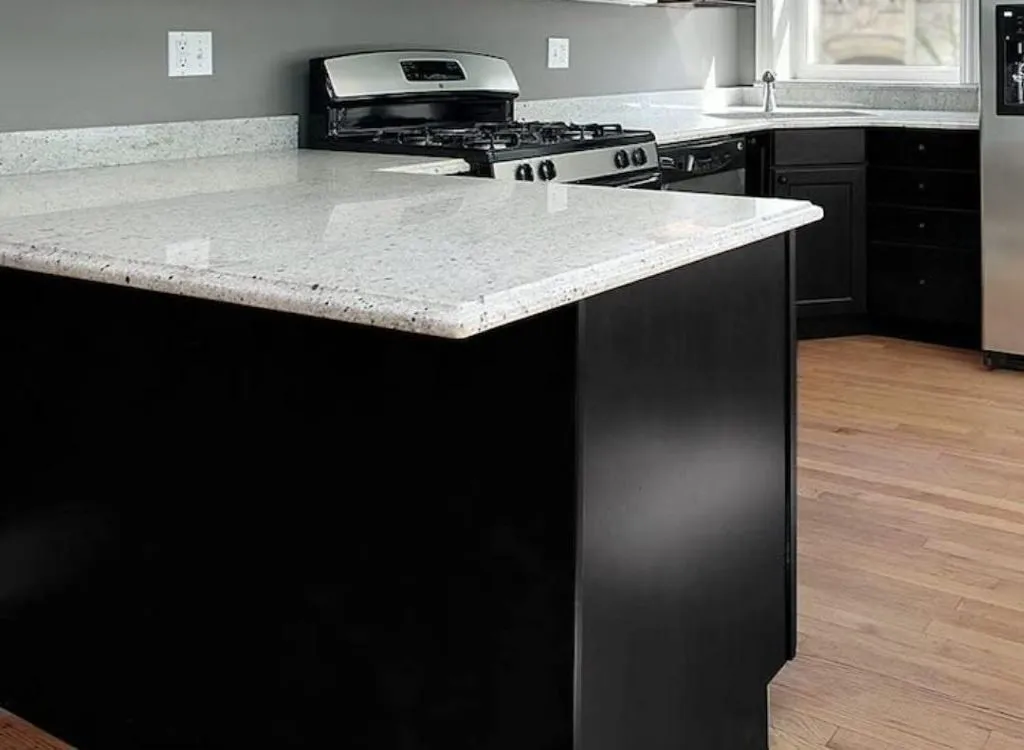
If you’re considering a kitchen remodel, you’ve probably been doing your research on the different materials available for countertops. One option that has become increasingly popular in recent years is quartz.
Quartz countertops are made from a man-made material that combines ground quartz with resin binders and pigments to create a beautiful and durable surface. Typically 90 percent of a quartz countertop consists of actual quartz, while the remaining 10 percent is made up of resin binders, pigments, and other materials.
In this blog post, we’ll take a look at the pros and cons of quartz countertops. This way you can make an informed decision about whether they’re right for your kitchen.
Pros Of Quartz Countertops
Appearance & Aesthetics

Variety
One of the biggest advantages of quartz countertops is their appearance. Since they are man-made, they come in a wide variety of colors and patterns.
You can find options that mimic the look of natural stone like granite or marble or go for a more unique pattern or color. Quartz countertops can be mixed with small metal pieces or even recycled glass to create interesting hues and tones.
Customization
If you want a completely unique aesthetic for your countertops, quartz may be the best option for you. You can customize quartz countertops to match any specific kitchen décor. So if you have a unique backsplash, unusual flooring, or rare cabinet color that you are trying to match, quartz countertops may be the best way to go.
Consistency
Unlike materials such as granite or marble, quartz is manufactured to have a consistent pattern and color. This means that you won’t have to worry about your countertop having any imperfections or inconsistencies. Marble and granite may be beautiful materials, but since both are natural stones, you never know exactly how your finished countertop will appear.
Stain-Resistant
Quartz is also non-porous, which means that it won’t absorb spills and stains like other materials. Unlike natural materials like granite, marble, and wood which can absorb liquid through microscopic holes, quartz is completely water-resistant.
So if you have young children or are just prone to spilling liquids in your kitchen, quartz is a great way to avoid having to deal with stained or discolored countertops. Since quartz is non-porous, it also does not allow bacteria to penetrate its surface, making it easier to disinfect.
Durability
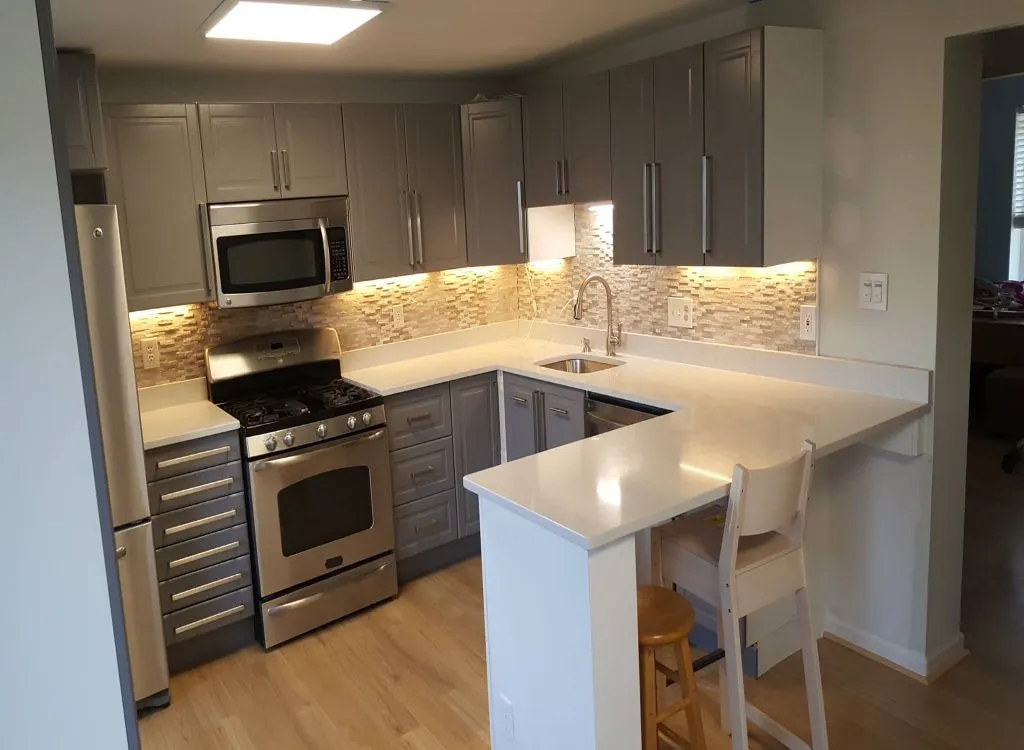
Scratch-Resistant
One of the most appealing aspects of quartz is its durability. In fact, quartz is one of the hardest minerals on Earth. It’s estimated to be more than twice as strong as granite, making it an ideal choice for remodeling kitchens. Since quartz is so hard, it’s extremely scratch-resistant.
Chip-Resistant
Quartz has a hardness rating of 7 to 7.5 on the Mohs scale. For comparison, consider that diamond has a rating of 10 on the Mohs scale. For this reason, quartz is also less likely to chip than other countertop materials.
Heat-Resistant
Quartz countertops can withstand high temperatures without damage, which makes them ideal for use in the kitchen. While the maximum heat resistance of a quartz countertop will depend on the exact specifications provided by the manufacturer, most quartz countertops are heat-resistant up to approximately 150 degrees Fahrenheit. This means that warm to moderately hot pots or pans can be placed directly on the countertop surface without fear of damage.
Warranties
Since quartz is so scratch-resistant, chip-resistant, and heat-resistant, it is also more likely to be backed up with a robust manufacturer’s warranty. While the terms of the warranty will depend on the particular manufacturer, most quartz countertops come with at least a 25-year warranty. Some manufacturers even offer a lifetime warranty.
However, you should be aware that these warranties typically only cover manufacturing defects and any damage sustained during regular use. So if you don’t abuse your countertops with excessive heat, pressure, or outdoor usage, you could have guaranteed countertops for life.
As a result, quartz countertops are a wise choice for those looking to remodel their kitchen in an attractive and durable way.
Cleaning and Maintenance
Easy To Clean
Quartz countertops are a popular choice because they’re beautiful and durable, but they also have another major advantage: they’re easy to clean. Unlike other materials, quartz is non-porous, so it doesn’t absorb spills or trap bacteria.
The non-porosity of quartz means that all you need to clean quartz countertops is a soft cloth and some soap and water. For tougher stains, you can use a mildly abrasive cleaner like Bon Ami. Since quartz is so resistant to scratches and staining, you won’t have to worry about damaging your countertops with harsh chemicals.
Low-Maintenance
If you’re looking for a low-maintenance countertop material, quartz is a great option. As noted above, unlike natural stone materials, quartz will not absorb liquids.
This means that spills cannot penetrate the surface, making them easy to wipe up. Quartz is also resistant to stains and scratches, so you can enjoy your countertops for years to come without having to worry about them looking dated or worn.
Versatility
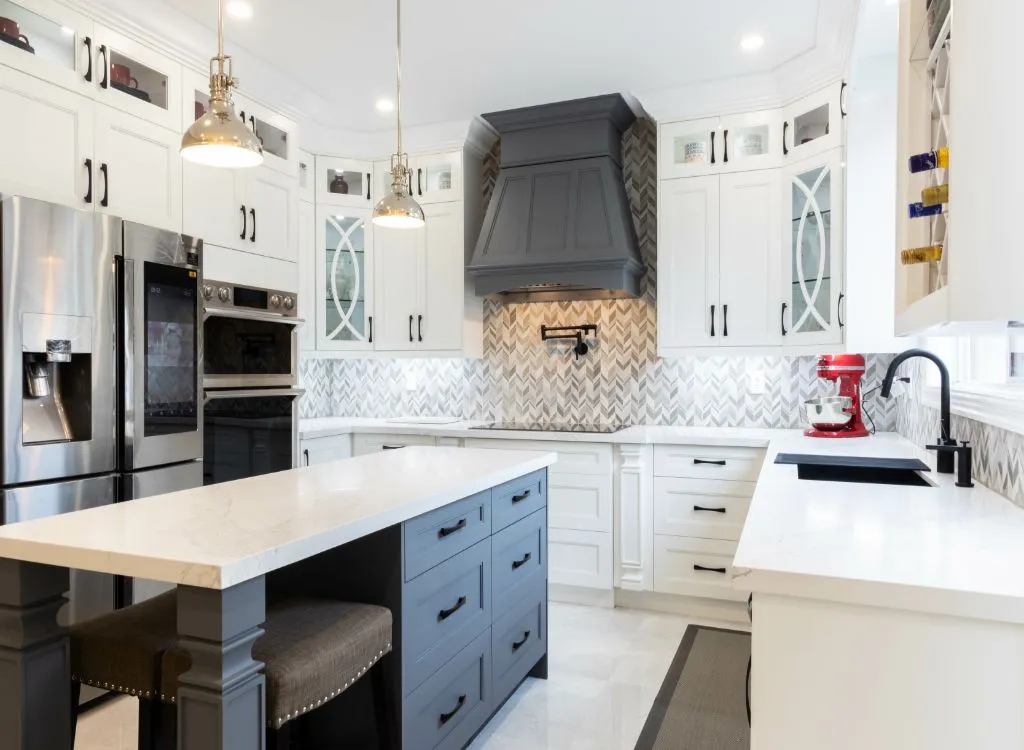
Not Just For Kitchen Countertops
Quartz is one of the most versatile countertop materials on the market. Its durability and resistance to staining make it a great option for high-traffic areas like kitchens.
However, quartz is not just an excellent material for kitchen countertops. The same qualities that make quartz ideal for kitchens also make it a fantastic choice for other parts of your home. For example, quartz makes an excellent material for bathroom countertops. Its durability and ability to resist stains also make it the perfect material for fireplace mantles or bar tops.
Match Any Color Or Pattern
Since quartz is man-made, it comes in a wide range of colors and patterns. So whether you’re looking for a sleek and modern look or something more traditional, there’s a quartz countertop that will suit your needs.
Unlike marble, granite, or wood, quartz can be customized to fit any color or pattern you desire. While many homeowners choose quartz patterns and colors that mimic natural stone, there are actually many more options to choose from. For example, you can create a more modern look by selecting a quartz countertop with a solid color rather than a more traditional stone design.
When it comes to countertops, quartz offers the best of both worlds: beauty and versatility.
Cons of Quartz Countertops
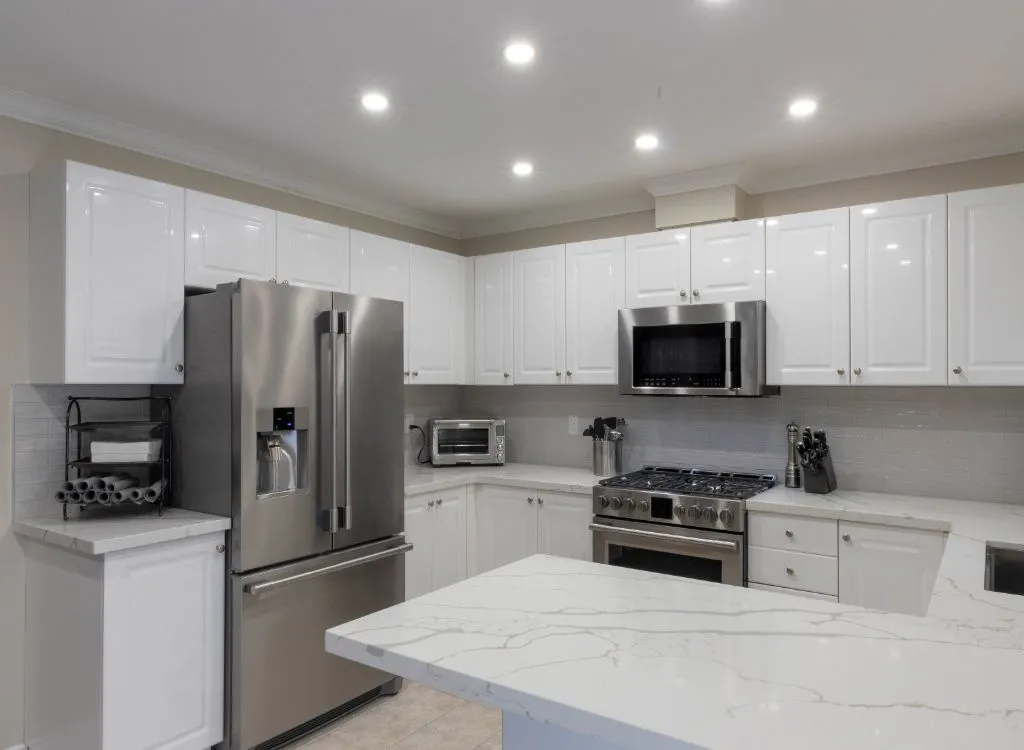
Although quartz countertops offer many advantages over other countertop materials, it does have a few drawbacks. Let’s take a closer look at some of the cons of quartz countertops.
Installation
One of the biggest cons associated with quartz countertops is that they are notoriously difficult to install. The process is much more complex than simply measuring and cutting the stone to fit your countertop. You will need to create a template, separate the pieces, and then glue them together with silicone adhesive.
Once the countertops are installed, you will need to finish them with caulk and grout. The entire process can be quite time-consuming and challenging, so it’s important to make sure you’re up for the task before you start.
Hard To Cut And Shape
Quartz is a hard material, and it can be difficult to cut and shape without the right tools. Quartz is not a very forgiving material, so any mistakes made during installation will likely be visible once the countertop is in place.
As a result, it’s important to make sure that you have an experienced contractor who is comfortable working with quartz. Otherwise, you may end up disappointed with your new countertop.
More Labor Costs
Quartz countertops are also one of the most expensive options due to the additional labor required for installation. Quartz is a harder material than granite or marble, so it requires special saws and cutting tools.
Unlike laminate or tile countertops, quartz countertops must be cut and fitted for each individual kitchen. As a result, installing quartz countertops can be a time-consuming and expensive process. So if you’re remodeling on a budget, quartz countertops may not be the best option for you.
Since quartz is so heavy and needs to be cut precisely to fit your kitchen, it’s best to leave the installation to the professionals. This added expense can be a deterrent for some DIY homeowners who are considering quartz for their counters.
Cost
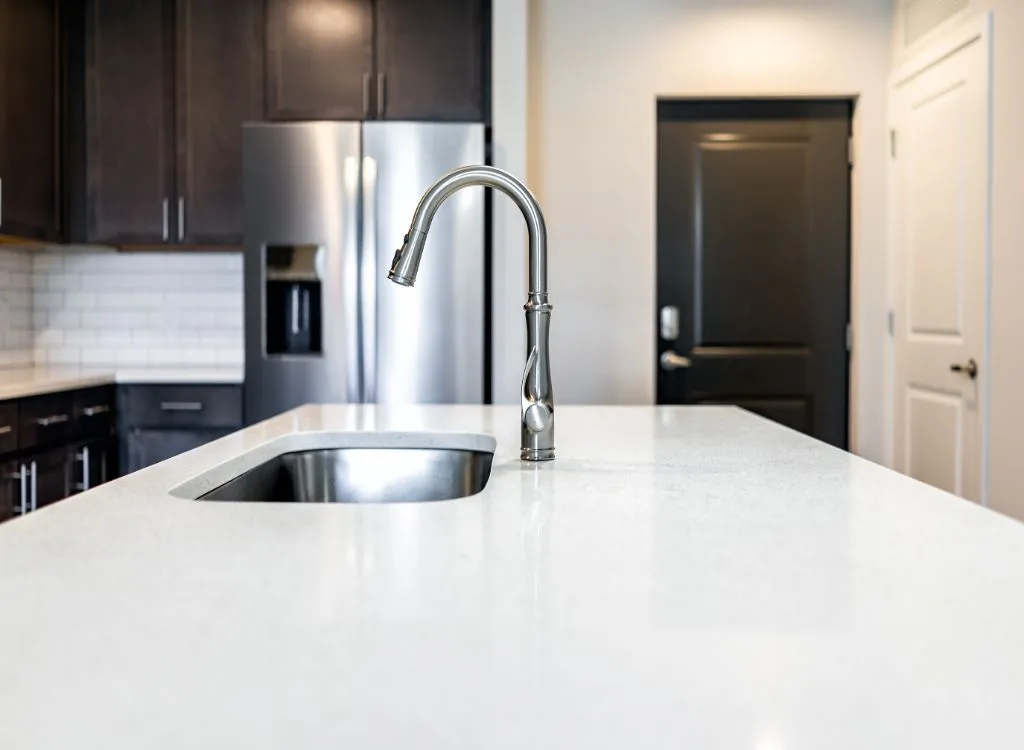
Quartz countertops are one of the most expensive countertop options on the market, and that’s not just because it is difficult to install. The material itself is pricey, so you’ll likely have to pay more for quartz than you would for other materials.
Expensive To Manufacture
Quartz is an abundant mineral found all over the world, but manufacturing quartz countertops is an expensive process. First, the raw quartz must be mined and then transported to a factory where it is crushed into small pieces. Next, the quartz is mixed with resin and pigments to create a uniform slab.
Expensive To Install
Lastly, as previously noted, the slab is cut to size, polished, and installed by a professional. Due to the time and effort required to produce and install quartz countertops, they tend to be more expensive than other materials such as laminate or granite.
If you’re working within a tight budget, quartz might not be the best choice for your kitchen counters.
Heat Damage
Damage From Hot Pots Or Pans
Despite its durability, quartz is not completely immune to heat damage. If you place scorching hot pots or pans directly on the surface, you can scorch or discolor the material. As we noted above, most quartz countertops are heat-resistant up to approximately 150 degrees Fahrenheit.
So while quartz will resist damage from moderately hot pots and pans, it is still vulnerable to high heat. For this reason, we always recommend using a cutting board or trivet when placing hot items on your quartz counters to avoid any damage.
Discoloration From Sunlight
There’s another downside to quartz that homeowners should be aware of: it’s susceptible to damage from sunlight. Exposure to direct sunlight can cause the color of quartz to fade and the material to become brittle.
For this reason, it’s best to avoid using quartz outdoors or in areas where it will be exposed to direct sunlight. If you do use quartz outdoors, be sure to provide plenty of shade and protection from the sun’s rays.
Appearance
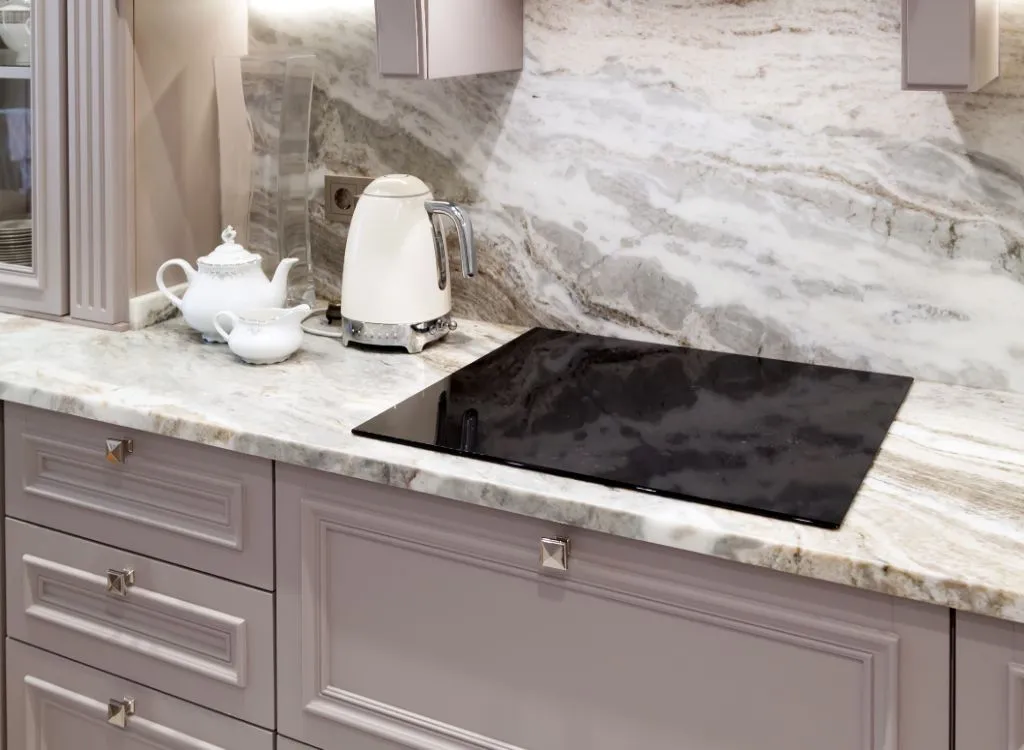
Less Natural-Looking Than Other Materials
While the durability and low maintenance of quartz make it a popular choice for remodeling kitchens, the stone’s appearance can be a con for some homeowners. Although quartz is available in patterns and colors that mimic natural stone, it will never look as natural as natural stone.
Unlike granite and marble, which are cut from natural slabs, quartz is manufactured from ground-up pieces of the stone mixed with resin binders and pigments. As a result, quartz countertops often have a more uniform, man-made look.
Harder To Conceal Seams
Another potential con of quartz countertops is that it is more difficult to conceal seams. This issue is especially true when it comes to lighter shades of quartz.
While quartz is extremely versatile due to the fact it is man-made, it can also look cheap or unnatural if it is not manufactured or installed correctly. For these reasons, homeowners who prefer the more natural look of stone may want to choose granite or marble instead of quartz for their remodeling project.
Stains
Quartz Countertops Still A Little Vulnerable To Stains
Although quartz countertops are resistant to most stains, it is not entirely stain-proof. As previously noted, approximately 10 percent of quartz countertops are made up of resin binders, pigments, and other materials. So while the quartz component is non-porous and stain-proof, the non-quartz material is not.
Some chemicals can react with the resin binders, pigments, and other materials that make up quartz countertops, leading to discoloration or even cracking.
Avoid using harsh chemicals or abrasive scrubbers, as these can damage quartz countertops and make them susceptible to staining. The best way to avoid this issue is to follow the manufacturer’s instructions on how to clean your quartz countertops.
Seams Are Vulnerable To Stains
The surface of quartz countertops is non-porous, which makes them resistant to most stains. However, the seam where the countertop meets the backsplash or where two pieces of quartz are joined together is porous and can absorb liquids.
So while you are generally safe from most stains on the countertop surface, you will still need to take precautions when it comes to your countertop seams.
Contact Brucksch And Sons
Quartz countertops are a popular choice for many homeowners, and it’s easy to see why. They have a sleek appearance that can coordinate with any style of kitchen, they’re durable and easy to clean, and they offer versatility in terms of design options.
However, before you make the decision to install quartz countertops in your home, it’s important to be aware of both the pros and cons of this material. We hope this blog post has helped you understand the benefits and drawbacks of quartz countertops so that you can make an informed decision about whether or not this is the right material for your project.
If you have any questions or would like more information about quartz countertops installation in Pasadena, DM, please don’t hesitate to contact us today. As a trusted local kitchen remodeler, Brucsch & Sons would be happy to help!
